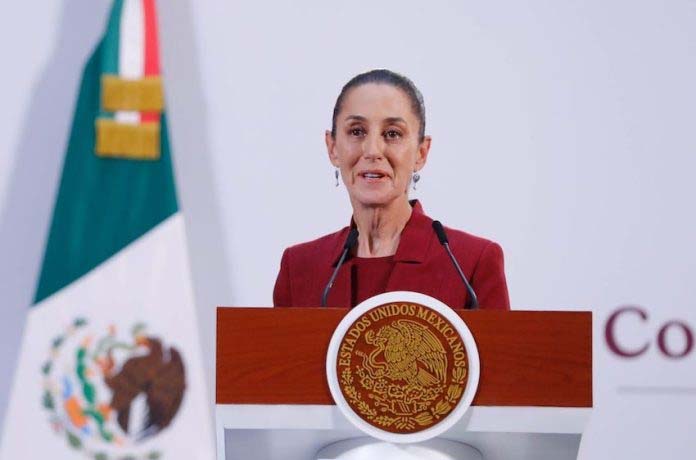by the El Reportero‘s staff
Claudia Sheinbaum’s ascent to the presidency of Mexico marks a significant shift in the nation’s political landscape, particularly concerning the judiciary. Sheinbaum, a former mayor of Mexico City and a member of the MORENA party, is known for her strong ties to the previous administration of Andrés Manuel López Obrador (AMLO). However, her approach to the judiciary has raised concerns, as it appears to reflect a broader disdain for judicial independence and accountability.
Since taking office, Sheinbaum has demonstrated a clear disregard for the judiciary’s role, positioning herself as a reformer who intends to challenge the established legal norms. Her administration has questioned the legitimacy of various judicial decisions and has hinted at a willingness to bypass or undermine judicial authority in favor of political expediency. This approach echoes AMLO’s previous rhetoric, which often criticized the judiciary as corrupt or out of touch with the needs of the people.
One of the most notable examples of this contempt is Sheinbaum’s vocal support for legislative reforms that could undermine judicial independence. By advocating for changes that would give the executive branch more power over judicial appointments and processes, she risks eroding the checks and balances fundamental to a democratic system. This could lead to a scenario where judicial decisions are increasingly influenced by political considerations, further entrenching a culture of impunity and corruption.
Moreover, Sheinbaum’s administration has faced criticism for its handling of judicial independence issues, including the treatment of judges and lawyers who oppose her policies. Reports of intimidation and pressure on the judiciary to align with her administration’s agenda have surfaced, raising alarms about the rule of law in Mexico. Legal experts warn that such tactics not only threaten the integrity of the judicial system but also undermine public trust in the government.
Sheinbaum’s actions could have lasting implications for Mexico’s democracy. The judiciary plays a critical role in safeguarding human rights and ensuring government accountability. By dismissing its importance, Sheinbaum risks perpetuating a cycle of political authoritarianism, where dissent is silenced, and the rule of law is diminished.
If unchecked, this trend could lead to a further erosion of civil liberties and the foundational principles that underpin a fair and just society.
In more Mexico’s news:
Sheinbaum’s first month in office marked by mixed security landscape
by Mexico News Daily
In her first month as Mexico’s president, Claudia Sheinbaum faced a complex security environment, characterized by a decline in homicide rates alongside ongoing violent crime in several regions. Federal security officials reported over 800 arrests since Sheinbaum’s inauguration on October 1, attempting to present a positive narrative about the nation’s security.
National Public Security System (SNSP) chief Marcela Figueroa Franco announced that preliminary data indicated an average of 75.3 homicides per day between October 1 and 28, totaling more than 2,100 murders. While this average represents the lowest for any October since 2017, the overall homicide rate remains alarmingly high. Figueroa noted that almost 25,000 homicides have occurred in Mexico this year, with nearly 50% concentrated in just seven states, particularly Guanajuato, which has recorded 2,562 murders.
Guanajuato’s violence is largely attributed to turf wars between rival criminal groups, notably the Jalisco New Generation Cartel (CJNG) and the Santa Rosa de Lima Cartel. Significant incidents, such as the discovery of twelve bodies in Salamanca and attacks involving car bombs, have underscored the state’s ongoing turmoil. Meanwhile, in Sinaloa, clashes among factions of the Sinaloa Cartel have increased, particularly following the arrest of a key cartel leader.
In response to escalating violence, Security Minister Omar García Harfuch detailed the federal government’s strategies, emphasizing enhanced intelligence gathering and inter-institutional coordination. He reported 824 arrests for high-impact crimes, including murder and kidnapping, and significant drug seizures, including over 8 tons of cocaine. García noted the National Guard’s pivotal role in these operations, asserting that its presence and community engagement efforts have expanded under Sheinbaum’s administration.
However, Sheinbaum’s tenure has not been without controversy. Reports of military actions resulting in civilian casualties, including the deaths of six migrants on her inauguration day, have sparked concerns over human rights abuses. Additional incidents involved civilian deaths during shootouts between security forces and criminals.
As Sheinbaum navigates a challenging security landscape, she continues to confront the legacy of violence from previous administrations while facing new pressures to achieve peace and stability without resorting to excessive force.



